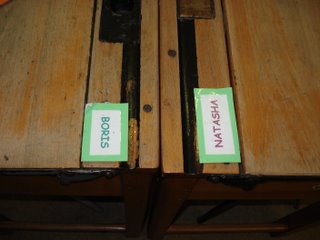'The Master of the Household has received Her Majesty's command to invite Reverend Dr. John D'Elia to a Reception to be given at Buckingham Palace by the Queen and the Duke of Edinburgh for Americans working in the United Kingdom.'
Right.
As with many of the amazing things that have happened since we moved here, I thought this was someone playing a joke on me. I mean c'mon, I'm just a guy from Burbank who has a very cool job in a great city. Anything more than that is a bonus, an extra, some serious icing on the cake. It turned out to be anything but a joke. This was a real event, attended by a cross section of Americans in the UK, including some very interesting people.
The event was yesterday, an absolutely stunning day in London. It was about 68 degrees outside with clear skies and a nice breeze. I arrived at the palace (OK, that's the first time I've ever typed that sentence), and showed my invitation and passport to the guard. He welcomed me through the gate and told me to follow the path to the main part of the residence. As I walked onto the grounds I looked back toward the gate I saw tourists about three deep, squinting in the sunlight and trying to figure out who I was. That moment made me laugh out loud.
I walked into the palace and was directed up one of these movie-set staircases. There were huge portraits covering every wall--the royal version of family vacation photos--and various sculptures and other artifacts by the dozens. I entered a large hall where I received a nametag with everything spelled perfectly (you have to know the D'Elia clan to understand how wonderful it is NOT to have to take a pen out and correct the spelling of your name). A waiter brought me a glass of wine, which was very good, and then there were a series of servers bringing hors d’oeuvres, which were also very tasty. I noticed from the nametags that there were a lot of bankers and financial types, as well as a large group of defense contractors in attendance. I chatted with a prominent chef, a retired USAF colonel, and a woman who runs the Walt Disney Company operations in Europe. (I told her I was from Burbank, a medium-sized walk from her HQ. She wasn’t as impressed as I thought she should be, so I moved on.)
At one point people started getting into a line, and so I joined them. I’d assumed that the Queen would briefly enter the room to greet us, and that we would then resume our wine and nibble consumption, but that’s not what happened. As the line moved toward a doorway I was asked for my entry card and then found myself face to face with the Queen, whose hand was held out for me to shake it, which I did. The next hand held out to me was that of Philip the Duke of Edinburgh (the Queen’s husband for you anarchists out there).

When I moved through into the next room, I saw Don Johnson (he’s in a play over here), the photographer Annie Leibowitz, and Jerry Hall (alas, she was Mick-less). After some chatting and meeting some other folks, one of the royal household staff came up to the people I was with and asked us to stay together and continue our conversation (I was with the head of Sony Pictures in the UK, talking about where to find good Mexican food in London). Next thing I knew, the Duke of Gloucester joined us and we chatted with him for a while.
Logan Dunn (our associate pastor) and I moved into the next room, and after a while another of the handlers asked us to stay put again. A minute later we were face-to-face with the Queen, who asked us all some questions and politely pretended to be interested in the answers. When I said that I was the new minister at the American Church, she said she remembered one of our former ministers being on the radio occasionally, and told me that I should do the same. It was a direct order from the Queen, so I’ll be looking into that immediately.
No need to burden this report with a lot of comment about celebrity or how we’re all the same under the skin.
Meeting the Queen was amazing.





